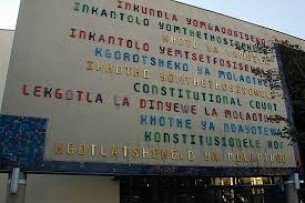ConCourt dismisses challenge against Organised Crime Act
What is a "pattern of racketeering" as defined in the Prevention of Organised Crime Act? That was what the Constitutional Court deliberated on recently in a case dubbed the "Amigos" trial. The Court dismissed the case which, incidentally, means corruption charges against Julius Malema still stand, according to Business Report.
Had the court ruled otherwise, the prosecution of Julius Malema, the leader of the Economic Freedom Fighters (EFF), who is charged with racketeering, would have fallen away.
This was an appeal by corruption accused Uruguayan businessman Gaston Savoi in the “amigos” trial involving R144 million.
Savoi, along with 12 others – including senior public servants, are facing charges of racketeering, corruption, fraud and money laundering, relating to the supply of water purification and oxygen plants to the KwaZulu-Natal departments of local government and health.
Intaka Holdings, a company owned by Savoi, is alleged to have submitted inflated prices for water purification plants in collaboration with high-ranking officials.
MEC for economic development Mike Mabuyakhulu and MEC for health and now provincial speaker Peggy Nkonyeni were originally arraigned for the same trial, but charges against them and eight others were later withdrawn.
Two business associates of Savoi turned their backs on him at the end of September 2011 and, in a plea bargain with the National Prosecuting Authority (NPA), said they would testify against him and others.
The case has been dubbed the “Amigos” trial because of the chummy way in which Savoi, politicians and public servants addressed each other in email correspondence.
Savoi is on trial together with former provincial treasury boss Sipho Shabalala, who allegedly received R1m as a donation to the ANC.
Savoi and his co-accused Fernando Praderi launched a pre-trial challenge to Poca with a view to having certain provisions declared unconstitutional, which could affect all racketeering trials.
Savoi is facing similar charges in the Northern Cape, with co-accused provincial ANC chairman and finance MEC John Block.
They are charged with tender fraud estimated at around R112m, involving Intaka and the provincial department of health’s acquisition of water purifying equipment.
Savoi and Praderi sought an order declaring the definitions of “pattern of racketeering activity” and “enterprise” in Poca void for vagueness and over-breadth. They argued that the sections that relied on these definitions were similarly unconstitutional.
They also contended Chapter 2 of Poca operated retrospectively, in violation of the rule of law and the right to a fair trial in the constitution.
The high court dismissed their application, but Judge Isaac Madondo ruled some sections of Poca were unconstitutional because the provisions used the words “ought reasonably to have known”, something Savoi and Praderi had not asked for.
The two applied to the ConCourt for leave to appeal and the NPA applied for leave to cross appeal.
Continues at source.
















